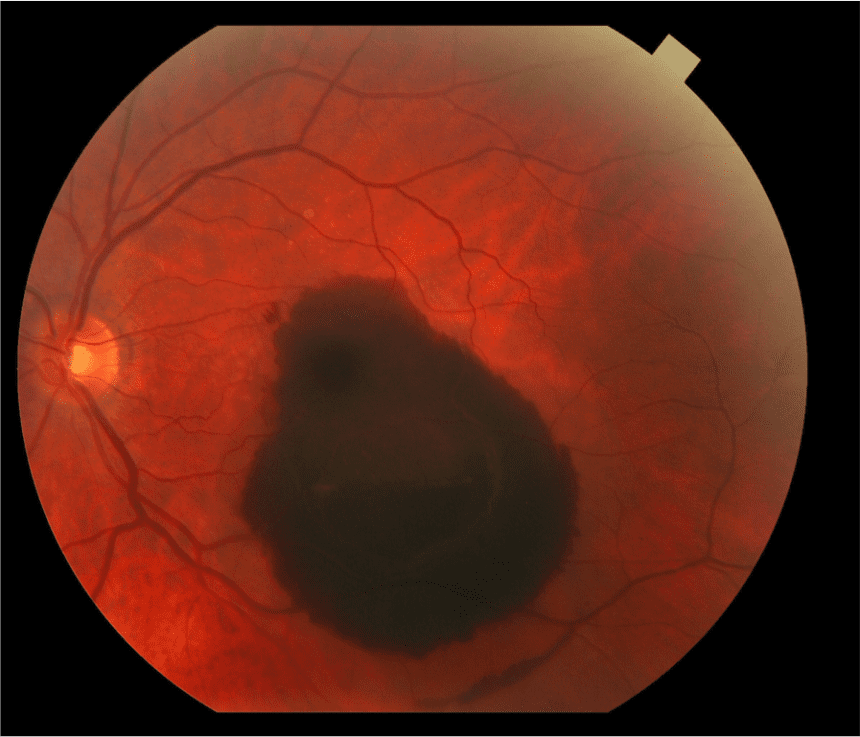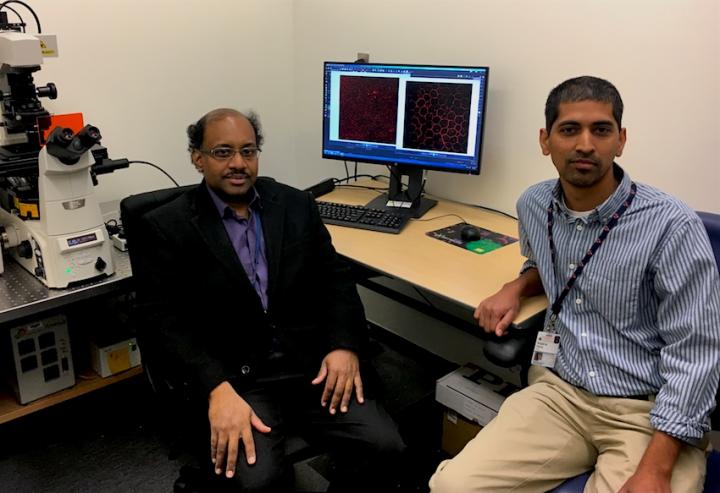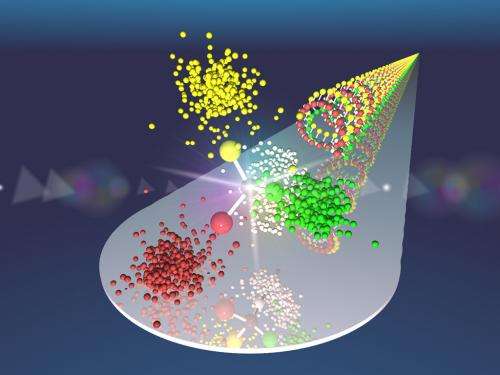
Experiments show promising results for a drug that could lead to a lasting treatment for millions of Americans with macular degeneration.
Researchers at the University of North Carolina School of Medicine today published new findings in the hunt for a better treatment for macular degeneration. In studies using mice, a class of drugs known as MDM2 inhibitors proved highly effective at regressing the abnormal blood vessels responsible for the vision loss associated with the disease.
“We believe we may have found an optimized treatment for macular degeneration,” said senior study author Sai Chavala, MD, director of the Laboratory for Retinal Rehabilitation and assistant professor of Ophthalmology and Cell Biology & Physiology at the UNC School of Medicine. “Our hope is that MDM2 inhibitors would reduce the treatment burden on both patients and physicians.”
The research appeared Sept. 9, 2013 in the Journal of Clinical Investigation.
As many as 11 million Americans have some form of macular degeneration, which is the most common cause of central vision loss in the western world. Those with the disease find many daily activities such as driving, reading and watching TV increasingly difficult.
Currently, the best available treatment for macular degeneration is an antibody called anti-VEGF that is injected into the eye. Patients must visit their doctor for a new injection every 4-8 weeks, adding up to significant time and cost.
“The idea is we’d like to have a long-lasting treatment so patients wouldn’t have to receive as many injections,” said Chavala. “That would reduce their overall risk of eye infections, and also potentially lower the economic burden of this condition by reducing treatment costs.” Chavala practices at the Kittner Eye Center at UNC Health Care in Chapel Hill and New Bern.
All patients with age-related macular degeneration start out with the “dry” form of the disease, which can cause blurred vision or blind spots. In about 20 percent of patients, the disease progresses to its “wet” form, in which abnormal blood vessels form in the eye and begin to leak fluid or blood, causing vision loss.
While anti-VEGF works by targeting the growth factors that lead to leaky blood vessels, MDM2 inhibitors target the abnormal blood vessels themselves causing them to regress — potentially leading to a lasting effect.
Chavala and his colleagues investigated the effects of MDM2 inhibitors in cell culture and in a mouse model of macular degeneration. They found that the drug abolishes the problematic blood vessels associated with wet macular degeneration by activating a protein known as p53. “p53 is a master regulator that determines if a cell lives or dies. By activating p53, we can initiate the cell death process in these abnormal blood vessels,” said Chavala.
The Latest Bing News on:
Macular degeneration
- 5 health behaviors that can make you blindon May 7, 2024 at 9:53 am
Most of us are aware that certain diseases or injuries can lead to vision loss but not realize that everyday behaviors can also harm our sight.
- AsclepiX Therapeutics Completes Enrollment in DISCOVER Trial for Neovascular Age-Related Macular Degeneration (nAMD)on May 6, 2024 at 5:00 am
The DISCOVER Phase 1/2a trial is an open-label, single ascending dose, 9-month study that will evaluate the safety and bioactivity of AXT107 ...
- Boehringer Ingelheim shares positive results from the first study worldwide in diabetic macular ischemiaon May 6, 2024 at 4:01 am
Boehringer Ingelheim today presented positive data from the HORNBILL Phase I/IIa study of BI 764524, the first ever study exploring a potential ...
- Home-monitoring tests lack satisfactory diagnostic accuracy to identify neovascular age-related macular degeneration:JAMAon May 5, 2024 at 7:30 am
A recent study found home-monitoring tests as a potential solution to reduce the burden of neovascular age-related macular degeneration (nAMD) on patients and healthcare systems. The ...
- Macular Degeneration: 11 Ways to Protect Your Eyeson May 2, 2024 at 9:17 am
It is crucial to be aware of the risk factors and symptoms associated with AMD to detect and manage the condition early.
- Macular Disease Foundation issues warning to Aussies beer and wine drinkerson May 1, 2024 at 1:27 am
is linked to a larger risk of age-related macular degeneration or irreversible vision loss. More than 1.5 million Australians are affected by AMD and the foundation led a systematic review of ...
- Texas Company’s Mission to Cure Macular Degeneration Blindnesson April 30, 2024 at 8:14 am
Mesogen Inc. out of The Woodlands, Texas, has developed a transplantable Retinal Pigmented Epithelium (RPE) patch to cure Macular Degeneration Blindness using autologous bone marrow-derived stem cells ...
- Local group helps macular degeneration patients cope with vision losson April 26, 2024 at 3:07 am
To provide opportunity for encouragement, Phoenix-based Associated Retina Consultants, in coordination with the International Low Vision Support Group, has established a Macular Degeneration Support ...
- Top 6 Best Eye Supplement for Macular Degeneration in 2024on April 24, 2024 at 5:00 pm
Macular degeneration is a prevalent eye disorder that typically results in loss of vision in individuals who are 50 years of age and older. Although there isn’t a recognized cure for this ...
- High dose aflibercept may be promising for treatment of age-related macular degenerationon April 24, 2024 at 2:55 pm
Aflibercept 8 mg was non-inferior to 2 mg for best-corrected visual acuity at 48 weeks. 2. Ocular adverse events were comparable across treatment groups. Evidence Rating Level: 1 (Excellent) Study ...
The Latest Google Headlines on:
Macular degeneration
[google_news title=”” keyword=”Macular degeneration” num_posts=”10″ blurb_length=”0″ show_thumb=”left”]
The Latest Bing News on:
Macular degeneration treatment
- EyePoint Stock: NPDR Endpoint Miss Is A Buying Opportunity Based On Lead Programon May 7, 2024 at 9:50 am
Despite EyePoint Pharmaceuticals' NPDR endpoint miss, potential exists with 12-month phase 2 PAVIA data. Read why I think EYPT may present a buying opportunity.
- EyePoint Pharmaceuticals’ stock plunges as eye treatment fails to meet trial goalon May 6, 2024 at 6:10 am
Shares of EyePoint Pharmaceuticals dropped nearly 30% premarket on Monday after the company said its experimental eye disease treatment failed to meet a clinical trial’s main goal.
- AsclepiX Therapeutics Completes Enrollment in DISCOVER Trial for Neovascular Age-Related Macular Degeneration (nAMD)on May 6, 2024 at 5:00 am
The DISCOVER Phase 1/2a trial is an open-label, single ascending dose, 9-month study that will evaluate the safety and bioactivity of AXT107 ...
- Boehringer Ingelheim shares positive results from the first study worldwide in diabetic macular ischemiaon May 6, 2024 at 4:01 am
Boehringer Ingelheim today presented positive data from the HORNBILL Phase I/IIa study of BI 764524, the first ever study exploring a potential ...
- ARVO 2024: 36-month data from the GALE study of pegcetacoplanon May 5, 2024 at 3:27 pm
At this year's ARVO meeting, Ash Abbey, MD, Director of clinical research at Texas Retina Associates, presented 36-month data from the GALE study of pegcetacoplan for the treatment of dry age-related ...
- Potential target treatment discovered for vision losson May 3, 2024 at 10:05 pm
Scientists have uncovered a promising new target for treating age-related macular degeneration (AMD), the leading cause of blindness in older adults. This discovery paves the way for potential ...
- Scientists identify new treatment target for leading cause of blindnesson May 2, 2024 at 6:08 am
Medical College of Georgia scientists report that a gene previously implicated in the development of atherosclerotic lesions in coronary arteries could be key to understanding why many people don't ...
- Scientists Find Potential Treatment Target For Leading Cause Of Blindnesson May 1, 2024 at 11:43 pm
US scientists have found answers to why treatment for neovascular age-related macular degeneration (AMD) -- a leading cause o ...
- Texas Company’s Mission to Cure Macular Degeneration Blindnesson April 30, 2024 at 8:14 am
Mesogen Inc. out of The Woodlands, Texas, has developed a transplantable Retinal Pigmented Epithelium (RPE) patch to cure Macular Degeneration Blindness using autologous bone marrow-derived stem cells ...
- Local group helps macular degeneration patients cope with vision losson April 26, 2024 at 3:07 am
To provide opportunity for encouragement, Phoenix-based Associated Retina Consultants, in coordination with the International Low Vision Support Group, has established a Macular Degeneration Support ...
The Latest Google Headlines on:
Macular degeneration treatment
[google_news title=”” keyword=”macular degeneration treatment” num_posts=”10″ blurb_length=”0″ show_thumb=”left”]










